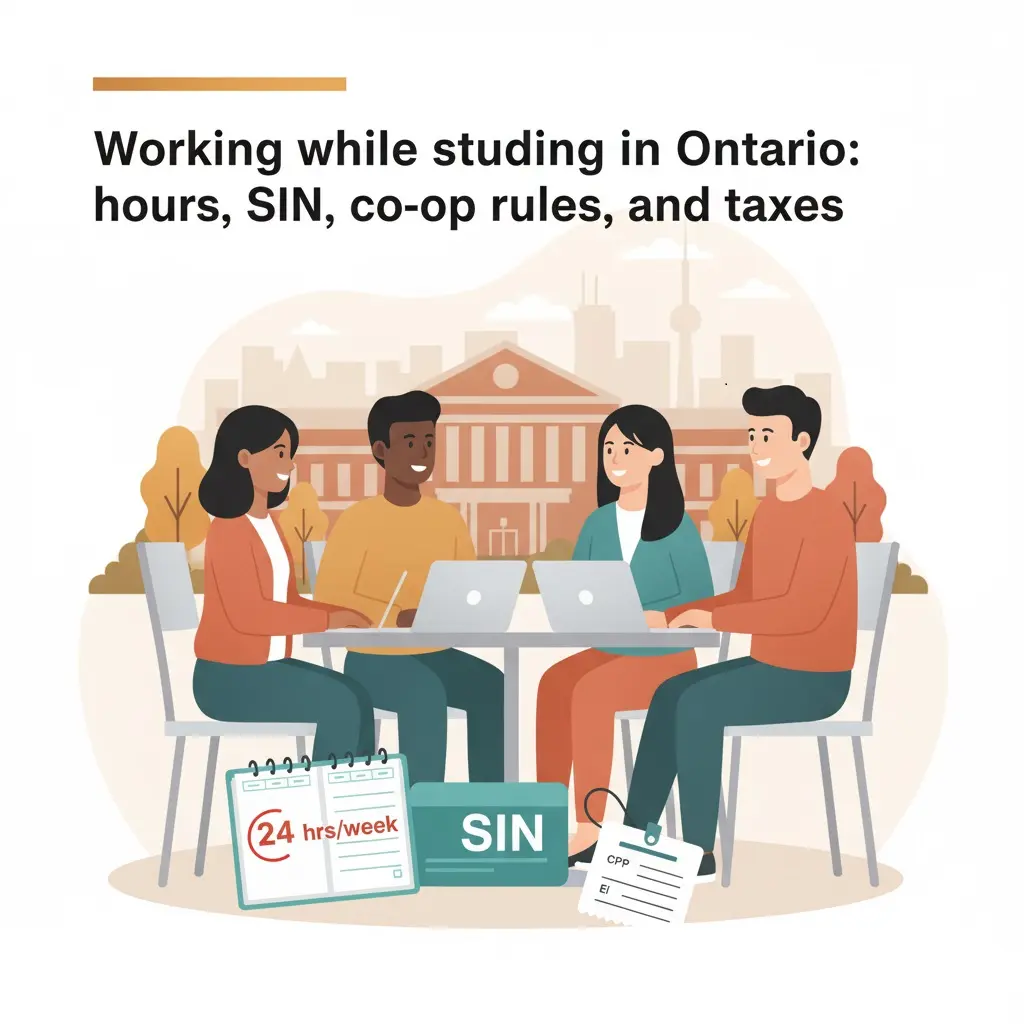Students in Ontario can work, but the rules differ for on-campus jobs, off-campus shifts, and co-op terms. This guide lays out the limits (including the 24-hour cap), when a co-op work permit is required, how to get a SIN, and what your first paycheque looks like at 2025 rates. It’s written for full-time post-secondary students who want to stay compliant and still cover bills.

Working while studying quick rules
- Off-campus during classes: up to 24 hours/week if you’re eligible.
- Scheduled breaks (e.g., summer/winter, reading week): unlimited hours off-campus if you were full-time before and after the break.
- On-campus: no federal weekly cap; you may work on-campus in addition to your off-campus hours (schools may set their own limits).
- Co-op/internships that are part of your program: need a co-op work permit; placement must be an essential program requirement and ≤50% of your program length.
- Start only after your program begins and while you remain eligible.
Read: Best Free Digital Skills for Ontario Students
Off-campus work: eligibility and the 24-hour cap
You can work off-campus without a separate work permit if your study permit lists the right conditions and you meet eligibility (full-time at a DLI, actively pursuing studies, etc.). During regular terms you’re capped at 24 hours/week in total across all off-campus jobs. During scheduled breaks, off-campus hours are unlimited. Continuous-enrolment programs without scheduled breaks stay at 24 hours all year.
Tip: If your permit text still says “20 hours,” the updated 24-hour policy applies as long as you meet eligibility.
On-campus work
Federal rules don’t set a weekly cap for on-campus work. You may hold an on-campus job in addition to your off-campus hours, though your institution can set internal HR limits.
Co-op and internships (part of your program)
If your program requires a work placement, you must hold a co-op work permit (even if the placement is unpaid). You’ll need a valid study permit and a school letter confirming the placement is mandatory for your program. The co-op/internship must make up 50% or less of your program. There’s no fee for the co-op permit.
SIN: how and when to get it
You need a Social Insurance Number (SIN) to be paid in Canada. Temporary residents receive a SIN that starts with 9 and has an expiry matching their IRCC work authorization. You can apply online. You may begin working after you’ve applied and then update payroll when the number arrives. Renew your SIN when you extend your permit.
Checklist (SIN):
- Confirm your study permit includes work conditions (request an amendment if missing).
- Apply for a SIN online; keep your confirmation safe.
- If your SIN (9-series) expires, renew it when you extend your permit.
2025 pay basics in Ontario
- Minimum wage (general): $17.60/hr from Oct 1, 2025; student minimum (under 18, ≤28 hrs during school) is $16.60/hr. Most post-secondary students are 18+ and fall under the general rate.
- CPP & EI on your pay: Employers deduct CPP at 5.95% (after the basic exemption) and EI at 1.64% of insurable earnings, up to annual maximums.
- Income tax: Withholding depends on your TD1 credits and total yearly income; common student credits include tuition and interest on government student loans.
Worked paycheque example (weekly)
Scenario: 19-year-old student working 24 hrs/week at $17.60/hr during classes.
- Gross weekly pay: 24 × 17.60 = $422.40.
- CPP (approx.): Weekly basic exemption ≈ $3,500/52 = $67.31 → pensionable = 422.40 − 67.31 = $355.09 → 5.95% = $21.13.
- EI: 1.64% × 422.40 = $6.93.
- Net before income tax: ≈ $394.34.
- Monthly rough take-home (×4.33 weeks): ≈ $1,707 (tax not included; real net varies by TD1).
- If you’re under 18 and paid the student rate ($16.60/hr), gross drops to $398.40; CPP may not apply if you’re under 18; EI still applies.
These are estimates. Actual deductions depend on payroll frequency, cumulative year-to-date amounts, and your TD1 forms.
Step-by-step compliance checklist
- Before first shift: confirm your study permit includes work conditions; if not, request an amendment (no fee) and then apply for a SIN.
- Track your hours: keep total off-campus hours ≤ 24/week during classes; on-campus hours don’t count toward this cap.
- Breaks: confirm that your week off is a scheduled break from your DLI before working unlimited hours.
- Co-op terms: get the co-op work permit before starting placements that are part of your program.
- Paycheque sanity check: hourly rate, CPP/EI, and any tax withheld line up with current rules.
Read: Student transit discounts in Ontario
FAQ
Can I hold two off-campus jobs?
Yes, combine hours across employers, but keep the total ≤ 24/week during terms.
Does on-campus work count toward the 24-hour limit?
No. On-campus hours are separate (no federal cap), but your institution may set internal limits.
What counts as a “scheduled break”?
Summer/winter breaks and reading weeks set by your DLI. You must be full-time before and after the break to work unlimited off-campus hours.
Do I need my SIN in hand before I start?
You must apply for a SIN; you can start working while you wait, then update payroll when it arrives.
Is an unpaid internship exempt from co-op rules?
No. If it’s required by your program, you still need a co-op work permit.
Key takeaways
- Off-campus work is 24 hrs/week during classes; unlimited during scheduled breaks.
- On-campus work is not capped federally and doesn’t count toward the 24-hour limit.
- Co-op placements that are part of your program require a co-op work permit.
- Apply for your SIN and keep it updated; 9-series SINs expire with your permit.
- At 2025 rates, a 24-hour week at $17.60/hr yields about $394 net before income tax after CPP/EI.
